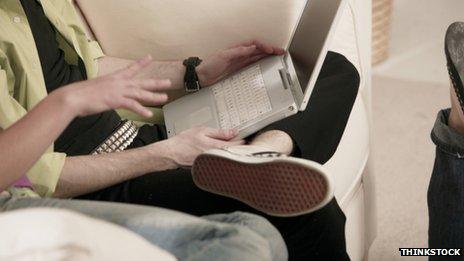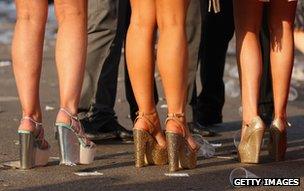Could teenagers be stopped from looking at porn?
- Published
- comments

MPs have warned it's too easy for children to watch online pornography. But could the internet be regulated to protect children? And should it?
Internet freedom campaigner Jim Killock, Open Rights Group
Default filtering is a form of censorship, is not simple and will not work technically. It's also a strange argument for the Conservatives to argue - that the state knows better.
If ISPs and the state decide what children can see, by default - automatically generated lists based on key words - an eight-year-old would probably still be able to find highly unsuitable, upsetting non-adult material, perhaps sites slagging off racial prejudice, perhaps sexist sites, perhaps sites slagging off religion.
And default filters might block lots of things adults want to see - such as political blogs or anti-censorship sites - and the government should not be given powers to censor adults. For example, the BBC wouldn't get banned for using the word "sex" three times on a page, but a blog or small independent site - that is reasonable but not as well-known - might be.
So the default filter would have to be pretty weak, otherwise too many adults would get annoyed as they wouldn't be able to access things and would switch the filter off anyway.
Practically speaking, protecting children has to be done with web browsers and on computers, you can't rely on networks. Firstly there are things like encryption, which online banking uses, which means the network provider can't tell people are talking to their banks, let alone what they are saying. Lots of sites are beginning to turn to encrypting as a way to get round filters.
Secondly, filtering already happens on mobile phones and people can still find pornography. So the nanny state approach will make parents feel safer, will make them think that the problem is taken care of, but default blocking is actually deeply irresponsible because it will fail to protect the most vulnerable children.

China is one country to curb online access
Parents need to work with their children, make judgements and install software on their computers at home.
When children are very young they can use a white list - so that they can see only BBC children's pages for example - when they get a bit older they can use a slightly larger number of websites, and when they are a teenager, they might decide to only block certain sorts of material, or only black list a few sites.
Parents need to be able to decide what is best for their child, and deciding parents are not capable of learning how to install software is insulting.
Andrea Leadsom MP
It's very important that something drastic is done to change the ability of parents to control how much pornography children can access. At the moment, children are often the most savvy person in a household in terms of IT, and there are multiple points of access to the internet in a household, so even if parents are extremely capable they struggle to always be on top of it.
It's not just pornography that is an issue, it's self-harm, anorexia, bomb making sites, suicide sites.
Society has always held the view that it has been a right of parents to protect their children - to decide when and what they eat, when they go to bed etc. But with this "wild west" that has developed, parents are neither capable nor have the time to ensure they can. With internet enabled TVs coming, they will be completely sunk.
Things can be changed in one of two ways. At ISP level, they have the ability to block sites. They should take the initiative, and when adults sign up they should offer a parental filter. There should be a range of choices - from blocking pornography or self-harm, or bomb-making websites. Adults sign up and pay the bills so they should have the ability to change it at their own behest. They could introduce different passports for different family members as well.
The other way that things could be changed is with the move away from .co.uk and .com, there could be .18 or .explicit or .xxx.
Introducing website terminology would require a structural shift in the industry. There is a whole raft of bodies that monitors obscene content in the non-download world, like the British Board of Film Classification, the watershed, Ofcom, and we could take the view that the internet needs something like that - it could be that a domain would have to pass some kind of rating. Whilst on face of it, it seems like it might be a hugely imposing burden for an organisation, it is exactly what happens if you are a film maker, it's just harder as it has not happened before.
Reg Bailey, from the Mothers Union and author of 2011 report on children's sexualisation
At the moment the default position is that parental controls are switched off. But a lot of parents don't have the confidence or the capability to switch them back on.
The MP Claire Perry wants us to opt in, to make these filters automatic, so that you'd have to opt out to get adult material. But there's a danger that would lead parents to a false sense of security.
I prefer the active choice proposal, where parents are given a choice when they buy a device. You would be asked when you set it up "do you wish to activate adult or age restricted material?"
You'd need to be an adult to have the pin to make that choice. You can never make filters 100% effective. But the hope is that "active choice" would encourage parents to talk about it with their children. You need to talk about these things to give your children that emotional resilience.
It's about recognising that the porn world is not the real world that relationships are built in. Unfortunately a lot of parents are scared of the online world.

The porn aesthetic is now mainstream, critics say
Of course, tackling internet porn is not enough. Sexting between children is a big issue and emails get uploaded up on to the web.
We know from CEOP that almost a third of paedophile material is self-generated by young people. Sexualised imagery in advertising and on billboards has become the wallpaper of our lives.
Music videos should be age rated, and those age ratings could be embedded so that devices could block them. It's not censorship. You can make whatever pop video you like but it should have an age rating so that parents can put in place the controls they like.
Brooke Magnanti, author of The Sex Myth and Belle de Jour
There seems to be this consensus that porn is bad and we need to do something about. But it's not clear what the bad outcomes are. Is it that kids are having sex earlier?
The fact is that the average age of kids having sex for the first time has stabilised. And the percentage of children having sex has gone down.
I do understand parents wanting to control what goes on at home. They want help but they don't need a politician saying here's a big off switch for the internet.
A big responsibility for parents is to show their kids what their morals are - and that depends on the family and the age of the children.
The internet has changed the delivery of porn. But I don't think the content has changed much since the early days of the web. One way it has changed is that there are many more "cam girls" working from home and there's a lot more feminist porn celebrating different body types.
There is lots of decent porn out there but people have got used to not paying. The free porn aggressively pushes a lowest common denominator porn.
As for the argument that it makes teenage girls want to wax - that view is a little bit outdated. Porn survives because it evolves, and what looks dirty 10 years ago doesn't look dirty anymore.
If I had kids I'd be more worried about the messages they get from women's magazines and advertising. Porn is fantasy, it is up front about the fact it's not realistic. Whereas Glamour and others like it say you can get this body in two weeks. They're telling you a lie.
My worry about Reg Bailey's suggestion is that parents would use that as a way of not having a conversation about porn. You could turn the internet off tomorrow but porn wouldn't go away.
Justine Roberts, co-founder of Mumsnet
There might be a lack of evidence about the deleterious effect of porn. But most parents know it would be harmful for both boys and girls. It creates this expectation of performance for boys. And for girls the message is that it's all about pleasing the boy.
The key for parents is to keep the lines of communication open. I wouldn't advocate the Claire Perry approach of a default off switch - there's a danger of believing you have a silver bullet and don't have to discuss porn. But I do think there is something in "active choice", which would ask parents "would you like a filter or not?" I also think Google Safe Search is a good option. It's quite hard to find though - Google could make it far more front and central.
Of course a determined teenager will find porn if they really want to. Where parents want more help is to stop a younger child from stumbling across porn.
Some commentators have said parents shouldn't allow the internet in children's bedrooms and shouldn't give them smartphones. But this isn't practical. Mobile phone is how they live and communicate. All teenagers run their social lives on Facebook. It would be like taking their friends away.
Sonia Livingstone, professor of social psychology, LSE
For the vast majority of young people, porn is a rite of passage. But the internet has made porn much more diverse and extreme. And for a vulnerable minority, internet porn can lead you away from normal expectations to more abusive sexual behaviour.
The media perception is that all young people look at internet porn. But my survey suggests that only a quarter of 9-16 year-olds have seen sexual images and only 11% on websites.
However there's a genuine worry that porn may make girls feel under pressure in their early to mid-teens to perform various acts like oral sex. Certainly all girls feel judged on their sexual potential.
But I don't think you can blame the internet for that. I wouldn't be surprised if boys found the sexual expectations oppressive too.
The solution would be to have the policy of "active choice" - every ISP subscriber should be faced with a choice.
I don't think we've given that a try. We are used to tools for spam and viruses and we don't panic about them anymore. We need the same for porn. But the Claire Perry approach where adult material is automatically switched off isn't necessary.
Porn is not part of sex education and we don't talk about what's on the internet. Both parents and teachers are often embarrassed to talk about it. Personal Health and Social Education classes would be the logical place to discuss internet porn.
Feminist activist and writer Julie Bindel
People need to recognise that pornography is a depiction of horrific sexual violence, where real women are hurt. It is not just pictures. If we didn't have misogyny, we wouldn't have these depictions of women being hurt.
Contradictory to what pro-porn libertarians say about the feminist position on this, it does not say a man reads porn and goes out to rape women - it has never sought to prove cause and effect. It is about misogyny, and creating an environment in which it becomes a normalised part of popular culture, that is objectionable - that people expect women to engage in humiliation and painful acts.
Pornography online goes far beyond what it was like 10 years ago, it gives people anonymity and they don't need permission to be on a shelf.
State censorship is not the issue. I wouldn't trust the state to censor it, as I don't think they'd see things in the way I do. They might think it's disgusting to have a book which shows women where their clitoris is, which would be perfectly acceptable in my view.
Legislation would help. There needs to be something like incitement to sexual violence, or incitement to violence against women, similar to the incitement to racial hatred legislation.
There has got to be a proper understanding porn is a reflection of misogyny and these pictures are in a sense a crime as somebody has been hurt.
Andrew Murray, professor of law at the LSE
You could cut the UK off by building a massive firewall. Technically you can do this, it costs a lot but countries like Saudi Arabia and China have very expensive firewalls to keep out obscene material.
But what you find with the Great Firewall of China is the hackers and activists end up spending all their time building routes through it.
The legal situation in the UK is that it's illegal to possess images of child abuse and the government has made ISPs take action on this.
Some years ago the government said they'd regulate if internet service providers didn't do it themselves. If you're surfing and find a young person abused you can report it and the authorities will have a look and blacklist it.
For the general populace it does mask a lot of child abuse. But imagine doing that for all porn images. Most porn websites are domiciled in the United States and the First Amendment protects freedom of speech - porn involving adults is not deemed obscene.
And where do you draw the line? It would be a brave UK lawmaker that would say this isn't freedom of speech it's pornography. With someone like Robert Mapplethorpe [the photographer] it's getting very problematic - is it art or porn?
In the past we regulated the supply of porn using the Obscene Publications Act. You could only get pornography via a few routes. The problem with the internet is that any attempt to build border controls like firewalls would be very expensive, probably won't work for those people who are technically literate, and is legally problematical.
The "opting in" proposal might be legally possible. But any law would have to be compliant with the Human Rights Act's right to free expression. It it was seen as onerous it could be deemed disproportionate.
And there are technical issues with blocking certain material. If you block the word "rape" you may be blocking access to rape crisis centres. A computer can't contextualise.
Legislation is not a good option, it's a very blunt instrument. The best way to tackle this is to educate the parents. Sometimes they don't realise that social networking sites contain a lot of sexualised content put there by children.
And then there's sexting. Parents should maybe look at the pictures coming back and forth on their children's phones. It's different to reading someone's diary as a diary is kept for oneself. The world has changed dramatically and we're trying to catch up.
Johnny Anglais, porn performer and former teacher
Viewing the act of sex is not damaging, it's very normal and might even be helpful for young people. Yes, there are certain types of pornography like rape that are wrong but the principle of seeing people having sex is not damaging.
The problem is in Britain we see sex as something we can't talk about and if we do it's in a comedic, immature way.
And yet after eating, drinking and oxygen sexual gratification is one of our essential needs. The Dutch have far less teen pregnancy because parents talk to their children about sex. So the problem is not porn, it's our maturity about how we deal with sex.
Although I don't believe porn is a problem, I accept the laws of the land. And it's currently the case that children shouldn't watch porn.
So parents need to be more savvy if they want to control their children's access to porn. No child needs a smartphone - give them a basic mobile.
<italic>Reporting by Tom de Castella and Vanessa Barford</italic>